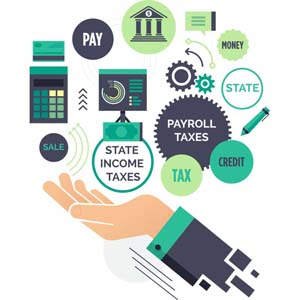Why Taxes Are Your Biggest Expense and How to Get Them Under Control
By John Vento
 |
| Taxes — federal and state income taxes, social security taxes, payroll taxes, sales taxes, and property taxes — can make up more than 50 percent of your overall expenditures. |
Where did all the money go? It’s a universal question. You pay the bills, buy groceries, and provide school supplies and clothes for your kids. Sure, maybe you go out to eat on Saturdays and take a once-a-year vacation — after all, you deserve some pleasure in life — but it’s hard to believe these small luxuries account for your stagnant savings or, worse, that credit card debt that’s slowly inching upward. So where did all the money go? Taxes — federal and state income taxes, social security taxes, payroll taxes, sales taxes, and property taxes — can make up more than 50 percent of your overall expenditures. If you want to change your taxes from your biggest expense to your biggest saving opportunity, take a look at a few tips:
Find a trusted financial advisor. You need a trusted advisor to guide you during good times and bad — someone whose primary goal will be to help you achieve your long-term financial objectives. The better your financial advisor knows you, the more effective she’ll be at finding the tax credits, deductions, etc., that apply to you and as a result can help you save big money on your taxes.”
Get organized. Tax records, such as records of income received, work-related expense reports, medical expense information, information about home improvements, sales, and refinances, and so on, should be carefully kept on a year-round basis — not thrown in a drawer or shoebox and then hastily assembled just for your annual tax appointment. Without tax records, you can lose valuable deductions by forgetting to include them on your tax return, or you may have unsubstantiated items disallowed if you are audited.
Retro-file to take advantage of missed deductions. Say you discover you have not taken advantage of several deductions or tax credits that you’ve been entitled to. Don’t beat yourself up: You can file an amended return to claim an additional refund. Generally, the statute of limitations is three years from the date you filed your tax return.
Get credit for your kids. Put together a list of all expenses related to your kids. You’ll want to include child care, tuition payments, 529 plan contributions, donations, medical expenses, etc. Ask your tax preparer to explore every tax credit that might be available to you, such as the child care credit, child tax credit, the earned income credit, and education tax credits, such as the Lifetime Learning Credit and the American Opportunity Tax Credit.
Know what gets taxed and what doesn’t in regard to insurance payouts. Generally, the cost of personal homeowner’s, automobile, boat, and umbrella liability insurance are not tax deductible. However, insurance reimbursements to the extent of your loss are generally not taxable. If you own a rental property, you can generally deduct most of the expenses associated with maintaining and managing the property, including the cost of property insurance, which includes premiums for fire and liability.
Retire from a big tax burden. Many Americans aren’t saving enough for retirement. That’s unfortunate for two reasons. Number one, the earlier you start to save for retirement the better. And number two, retirement saving is a great way to reduce the amount you pay in taxes. If your employer offers a 401(k) plan, invest as much as it will allow. Making elective salary deferrals to your company’s retirement plan allows you to defer tax on your salary and get a tax-deferred buildup of earnings within your plan until you start making withdrawals when you retire. Other options include IRAs, which are available to all wage earners at any salary level, as well as to nonworking spouses. Contributions to traditional IRAs may be tax deductible if you meet the requirements; your withdrawals will be taxable in the year that you make those withdrawals. In contrast, contributions to a Roth IRA are not tax deductible, but qualified withdrawals are tax free.
Get the most out of Social Security. If you are collecting Social Security benefits, up to 85 percent of these benefits could be subject to federal income tax. However, it’s important to note that you can avoid paying income tax on your Social Security benefits if your provisional income is $25,000 or less if you are single, or $32,000 or less if you are married and filing jointly.
Don’t get taxed by your health. Take full advantage of medical insurance premiums paid by your employer on your behalf. This is considered a tax-free fringe benefit. These medical insurance premiums are 100 percent deductible by your employer and tax free to you. All payments made by the medical insurance company to cover your medical expenses are also tax-free payments made for your benefit.
Don’t let taxes deflate your ROI. Inflation and taxes are perhaps the two biggest drains on your investment returns. When investing, you must always consider the tax consequences of your investment when determining your true rate of return.
Give a gift. Take advantage of gifting strategies that can help you prevent losing some of the value of your estate to taxes. For 2014, the gift tax exclusion is $14,000 per year. What this means is that you can make a gift in this amount to anyone — and to as many people as you like—every calendar year, and that money will not be subject to gift tax or included in your taxable estate.
When you understand how taxes work and know where to look for opportunities, you can actually minimize your tax payout, and as a result, save a lot more of your money. Those savings can then pave your way to financial independence. HBM
John J. Vento is author of Financial Independence (Getting to Point X): An Advisor’s Guide to Comprehensive Wealth Management (Wiley, 2013, ISBN: 978-1-1184-6021-4, $40.00, www.ventocpa.com). He has been the president of the New York City-based Certified Public Accounting firm John J. Vento, CPA, P.C., and Comprehensive Wealth Management since 1987. His organization is focused on professional practices, high net worth individuals, and those committed to becoming financially independent. He has been the keynote speaker at various seminars and conferences throughout the United States that focus on tax and financial strategies that create wealth. John has been ranked among the most successful advisors of a nationwide investment service firm and has held this distinction since 2008.
Find a Home-Based Business to Start-Up >>> Hundreds of Business Listings.
















































